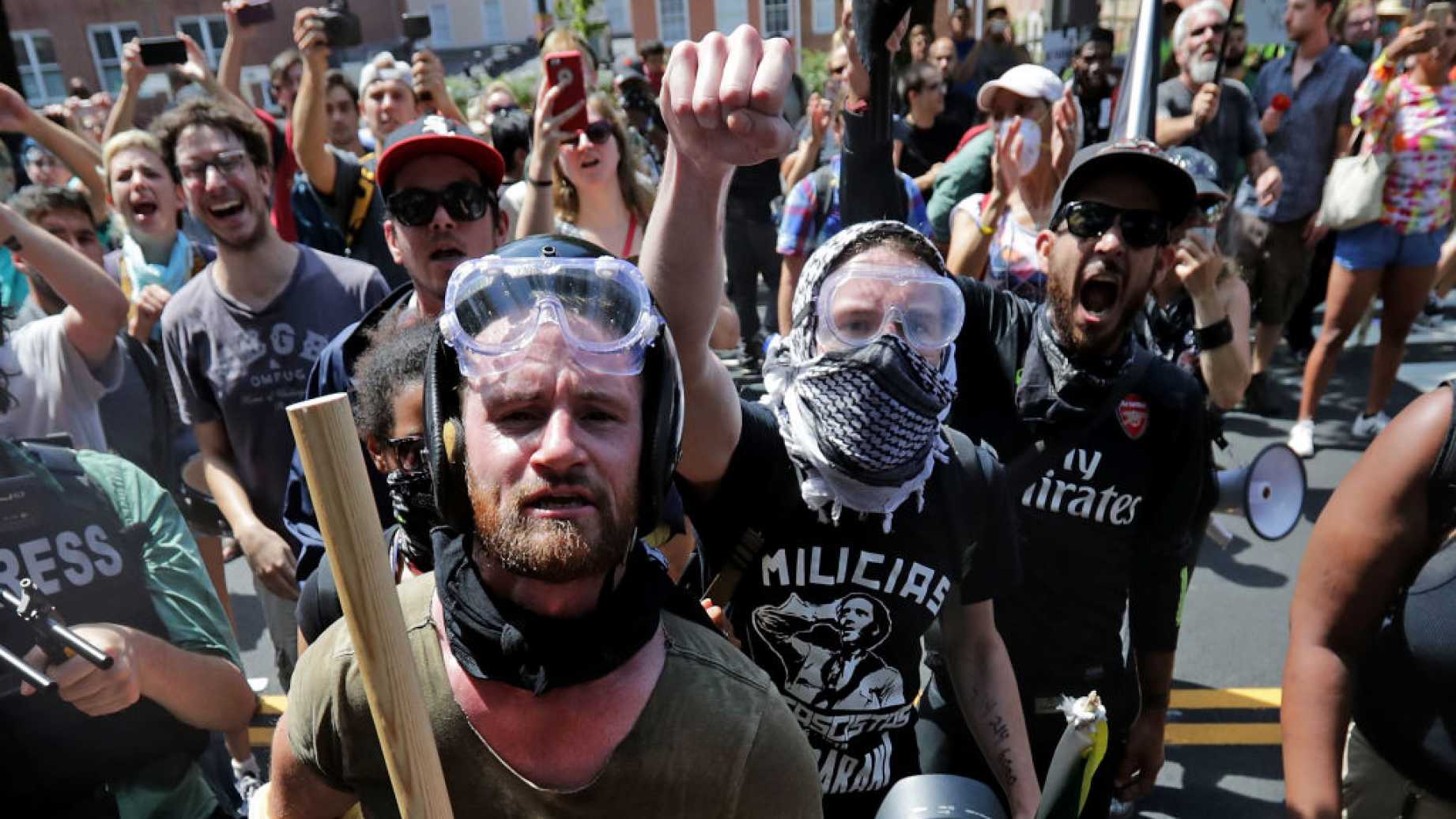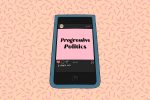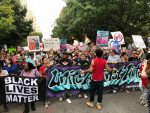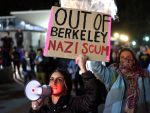The rise of nationalism and fascism in America has easily been one of the scariest movements within 2017. Ever since the infamous election, far-right extremists have moved away from the dark caves where they belong and flaunt their blatant racism, antisemitism and Islamophobia for the world to see.
It’s obvious at this point that America needs a hero, and one group named Antifa seems to have answered the call. The multiple groups of anti-fascists throughout the country have become mainstream after the election of Donald Trump, and while it’s wonderful to see people stand up and fight back against such oppressors, the main question going on in my mind, as a liberal, is whether Antifa’s violent and destructive tactics are something to admire or something to concern.
To the few who may not know what the group is and what they stand for, Antifa is a movement consisting of autonomous groups who are anti-fascist, anti-government and anti-capitalist, with its members’ political views mostly consisting of anarchism, socialism and communism. These groups aren’t just a new creation from the current political climate, as Antifa’s origins trace back after World War II, when the first Antifa network was created in Germany.
In America, they began in the late ‘80s under the name Anti-Racist Action (ARA for short), originating through certain punk subcultures. Their mission was to fight against neo-Nazi and white supremacist groups, as well as other racist and fascist ideologies. ARA began to die out around 2013, but they would soon become a precursor to the anarchist groups people know today.
On the day President Trump was inaugurated, Richard Spencer, a white nationalist, was punched straight in the face by a man clad in black attire, who was part of an organization named Antifa. On that day, the world knew who Antifa was and what they stood for. Nonviolence and civil disobedience isn’t the way to go; in order to fight against Nazis, it’s better to use fists and arson instead of words. And throughout the rest of the year, the actions committed by these far-left groups have garnered massive media attention.
In February, they were one of the many who protested alt-right member Milo Yiannopoulos from speaking at Berkeley, throwing Molotov cocktails at police officers and smashing windows around the area, essentially turning the campus into a disaster zone.
In mid-August, they were counter-protestors during the infamous Charlottesville rally, fighting back violent white nationalists with their own form of violence, leading to Trump arguing “both sides” had taken part in the mayhem and destruction of the city, which was met with much criticism due to his language failing to denounce the actual problem of white supremacy and neo-Nazism.
In late August, another Berkeley protest, only this time a “No to Marxism” rally, was demolished by Antifa members, ironically bashing protestors with shields reading “No Hate.”
Within such a short span of arson and chaos, it would be natural to expect many of Antifa’s foes to be on the conservative side, and that is very much true. But what is surprising is how many on the Left and even many anarchists aren’t fond of their tactics. Minority House Leader Nancy Pelosi made a public statement condemning the violence counter-protestors enacted upon the peaceful anti-Marxist protestors.
Anarchist website “It’s Going Down” slammed the movement for its hyper-focus on smaller groups or specific figures, rather than “the structural nature of our racist society.” Noam Chomsky, the father of linguistics and a leading voice for the Left, considers the Antifa movement “a major gift to the right, including the militant right.” Even Bernie Sanders, arguably the most famous socialist in America, and a figure treated with great respect by many anti-fascists, condemned counter-protestors such as the ones found in Berkeley in April, once news broke the university was nervous about security issues when they planned to schedule famous conservative spokesperson Ann Coulter.
The general public’s view isn’t much better. SurveyMonkey, a trusted polling center, discovered that while 46 percent of people said the far-right protestors were to blame for the riots and fights in Charlottesville, 40 percent said the blame fell to both sides, even though another poll showed a majority of Americans still disapproved of Trump’s address on the events.
But even if Antifa is incredibly controversial and unpopular, if they’re attempting to defeat people that hold a disgusting and hateful ideology, there should be nothing to complain about, right? While that argument could hold water, and it’s important to remember their actions are nowhere near as dangerous or reprehensible as their foes, Antifa’s message could still spell bad news for the future.

Looking into the past, violent protests have always received a backlash, and that includes from far-left activists or liberals. Famous internet analyst and current Assistant Professor in Princeton’s Department of Politics, Omar Wasow, analyzed the effects nonviolent and violent protests had on people through looking at black-led protests in the 1960s. The connection may seem nonexistent, but both involved autonomous fighting for progressive politics and social justice, so there are many parallels one can interpret between the two.
In the case of presidential elections, “proximity to black-led nonviolent protests increased white Democratic vote-share whereas proximity to black-led violent protests caused substantively important declines.” Looking even further, Wasow also examined the impacts of such different ideological executions from the 1950s to the 1980s, the peak of black-led protests in America: “In public opinion polls between 1950 and 1980, a majority of subjects identified ‘civil rights’ as the most important problem facing America at the same time that nonviolent black protest activity peaked and, likewise, responded with ‘social control’ when black-led violent protests were most active.”
While it may be just one study, there’s a lot to digest within Wasow’s work. Terms like “social control” have a conservative edge to their meaning, emphasizing terms like “law and order,” and once riots emerged in the ‘60s, so too did the rise of prominent Republicans like Richard Nixon. And with Donald Trump’s platform emphasizing a “law and order” view, as shown through his speech urging police officers to be mean during their arrests, it seems unwise to use violent tactics if Antifa wants people to stay away from more right-wing ideologues.
But probably the most important nugget of information on why Antifa may not be the strongest group to headline any Resistance can be found in a protest done just a few days after the Charlottesville riots. Thousands of counter-protesters flooded a right-wing Boston rally, but Antifa was largely nowhere to be seen, and it was a rousing success for the Left.
Not only did the original rally end shorter than originally planned, but the peaceful demonstrations garnered little to no ire from any critics against liberalism. One can even make arguments January’s Women’s March, an event that didn’t have any forms of anarchism or political violence, was a success, making the voices of many heard and help inspire many other peaceful protests towards Trump’s many unfavorable policies, such as the travel ban and the Republican health care bill.
In the case of myself, a proud liberal who leans into certain socialist ideals and policies, Antifa has been an infuriating group. As a supporter of a group that has advocated for peace, tolerance and understanding, their hypocrisy and willingness to destroy everything and everyone, including just moderate Republicans, in their path destroys all of what my party has stood for.
It’s true that peace and nonviolence is often generalized as always being the best solution, even though it has failed numerous times. Even I will admit the glorification of nonviolence can go overboard. But such destruction made by Antifa will only lead to people becoming more wary of the Democratic Party and what they stand for.
Yes, many Democrats are against Antifa, but the loudest voices are always the ones that turn people’s heads and enforce what people think about a group. And while I understand the frustration and anger these individuals have, in a strategic sense, their actions could very well lead to an eight-year Trump presidency, something that needs to be nipped in the bud and is the utmost priority for me and the rest of America.

















